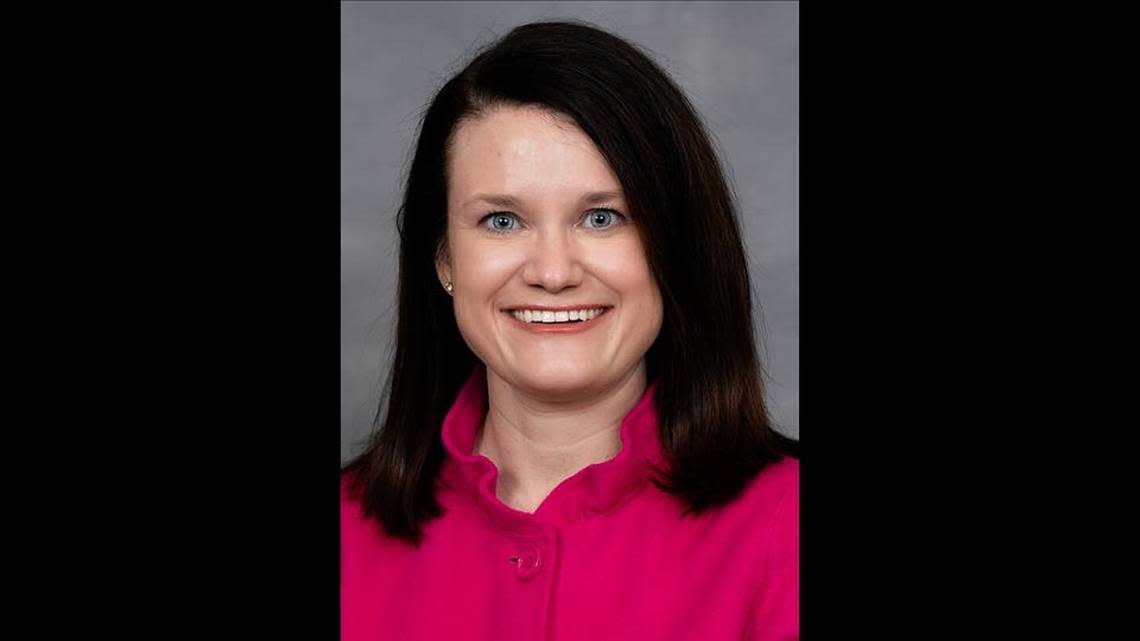5 ways NC Democrats and Republicans are working together on the child care crisis
Democrats and Republicans are sponsoring five bills together about early childhood in North Carolina, and seeking ways to address the child care crisis.
Daphne Alsiyao, speaking to reporters while holding her 8-month-old daughter Ella Rose, said that she’s about to move from Rockingham County to Forsyth County, where she and her husband are seeking child care for two of their three children. Alsiyao, who works for the North Carolina Partnership for Children, and her husband, a sheriff’s deputy, are on several waiting lists for available child care. At one center they tried, even the waitlist was full. She said the state’s “severe child care shortage” is especially dire for infants.
“Without child care, I’ll be forced to juggle caring for a toddler and an infant while working remotely,” she said, so her “stress is through the roof.”
“We need lawmakers to treat this crisis like the emergency it is,” Alsiyao said Thursday while joining a bipartisan group of lawmakers who offered possible solutions through five bills.
From helping locally owned child care centers trying to stay afloat, and parents and employers paying for child care, to funding prenatal doulas, Republicans and Democrats are working together.
Rep. Ashton Wheeler Clemmons, a Greensboro Democrat, said lawmakers in the Early Childhood Caucus filed five new bills on Thursday to focus on “solutions for the problems that are in front of us for the family, child care and workforce of our state.”
The business community wants to find a solution, too, said Debra Derr of the North Carolina Chamber.
“North Carolina’s employers have identified childcare as a critical factor in our state’s workforce challenges,” Derr said. “Without access to affordable, safe child care, a parent cannot go to work or is overworked at home.”

Here are the five bills and what the sponsors say about them:
▪ House Bill 321: Reduce Maternal Morbidity/Mortality/Medicaid. This bill would increase rates for obstetric coverage, including adding some doula coverage to prenatal Medicaid services.
Said Sen. Jim Burgin, an Angier Republican: “we have got to completely rethink how we look after and take care of our children.”
“We have about 116,000 children born in this state each year, and about 52% of those are born under the Medicaid system. And I firmly believe that child care begins at conception. So what this bill will do, it will pay for doulas to be involved from conception through birth,” Burgin said, with multiple doula visits to “get moms and those new babies off to a great start.”
▪ House Bill 322: Tri-Share Child Care Pilot Funds.
Clemmons described Tri-Share as an innovative model that divides the cost of child care among an employer, eligible employee and the state government. It will begin as a pilot program in three counties, Clemmons said, to “strengthen the child care workforce, and it will help businesses have child care as an incentive to keep their people employed, which is a win-win across our state.”
The Department of Health and Human Services would determine the three counties for the pilot program, Clemmons said.
▪ House Bill 342: Extend Child Care Compensation Grants.
Rep. David Willis, a Union County Republican, said that without extending these grants, which are part of federal childcare stabilization grants, the state won’t have what it needs to keep child care centers afloat. He said the $300 million to extend the program is “a big ask,” but without it North Carolina will lose child care providers.
“It has to be our No. 1 priority, and from a bipartisan perspective, we have prioritized that as our No. 1 ask,” he said.
▪ House Bill 343: Increase Rates/Set Floor/Child Care Subsidy.
Willis said they want to increase the rate for subsidized child care and put in a floor for the poorest counties for child care providers. The bill would allow counties to purchase more child care for children from low-income families and reduce waitlists.
“We’ve got to find a balance that allows us to be able to prop those businesses, and allow them to grow, sustain the current headwinds that we have, and to find a path forward,” he said.
▪ House Bill 344: QRIS/Star Rating System Reform. This bill would extend the deadline for star system assessments reporting that had been extended during the COVID-19 state of emergency.
Senate leader Phil Berger told reporters after the Senate session on Thursday that he and Burgin have had general conversations about addressing child care solutions and the $300 million for extending subsidies, but not yet about the specific bills.
If the bipartisan bills pass, Democratic Gov. Roy Cooper is likely to sign at least some of them. In his State of the State speech on Monday night, Cooper talked about North Carolina’s workforce requiring investment starting “with early childhood education at quality child care centers.”
Cooper referenced the $800 million in federal child care stabilization grants during the pandemic, calling it a triple play: “education for the child, a job earning money for the parent, and a badly needed employee for the business. We need to fill them with high quality staff and keep those childcare centers open.”
